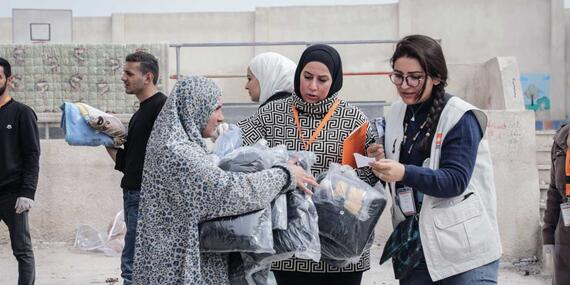Today's top news: Syria, Türkiye, Ukraine

Syria
A month after the devastating earthquakes, we and our humanitarian partners continue to scale up our response. At least 8.8 million people have been affected, with a majority expected to need humanitarian assistance.
Since 9 February, 583 trucks loaded with aid from seven UN agencies have crossed into north-west Syria via the three available border crossings.
Our humanitarian partners estimate that homes for some 2.7 million people have been damaged in Aleppo, Hama, Lattakia and Homs. Those displaced are in collective centers and host communities.
In Aleppo Governorate, the humanitarian situation is extremely challenging. More than 50,000 people are displaced in over 100 collective shelters inside Aleppo City. Some 20,000 others in the city have been displaced to the Tell Refaat enclave. Thousands more are with host families or in improvised shelters. Many people are fearful of additional earthquakes and sleeping in cars and open spaces.
Engineering committees in Hama Governorate estimate that nearly half of the buildings they’ve assessed are damaged. 33 schools there are reportedly still closed. Some 200 schools in Hama and 50 in Homs need rehabilitation.
More funding is urgently needed for the humanitarian response. Our flash appeal for Syria is currently 52 per cent funded – we have received $206 million of the nearly US$400 million required.
Türkiye
Today also marks one month after two deadly earthquakes struck southern Türkiye, wreaking havoc in the region and killing over 45,000 people.
We continue to support the Government’s response, by providing emergency relief, including food, medical supplies, shelter, winter supplies, hygiene and dignity kits and other life-saving items.
We and our partners have provided so far 5.7 million food packages and hot meals; 42,000 tents; 278,000 blankets; 181,000 mattresses; and 169,000 hygiene kits.
We also continue with assessment to identify the needs as they evolve. Priority needs include shelter, food, water, sanitation, and hygiene, and psycho-social support. The World Health Organization is also alerting on the need for immediate trauma care and post-trauma rehabilitative care as well as the provision of essential medicines and emergency kits. Access to safe deliveries and post-natal care is also a major concern with many health facilities being damaged or services disrupted.
The $1 billion Türkiye appeal is currently 9.6 per cent funded ($96.6 million received).
Ukraine
The security situation in the front-line town of Bakhmut in the eastern Donetsk region has deteriorated significantly in recent days.
Intense shelling is compounding an already precarious humanitarian situation. Access to the town remains limited, with a significant decrease in the number of volunteer groups still operating there.
Local authorities have reported at least eight civilian casualties in the last 48 hours. This includes one woman who was killed and two men who were seriously injured trying to cross a makeshift bridge out of Bakhmut.
Local volunteers continue to assist as many as 4,500 civilians still living in the town, out of a pre-war population of about 73,000 people.
In February, the UN sent 6 inter-agency convoys to the Donetsk region, carrying food, water, and winter and shelter materials for more than 77,000 people.
We also have some updates on the deadly attack on a residential building in the city of Zaporizhzhia on March 2nd. Our humanitarian colleagues on the ground say that 13 deaths, including that of an eight-month-old child, have been confirmed as of today. Two others are still missing.
The Humanitarian Coordinator for Ukraine, Denise Brown, met local authorities at the site yesterday. She stressed that civilians and civilian infrastructure are protected by international humanitarian law and should never be targeted.
Our humanitarian partners have provided emergency supplies, including food, clothing, bedding, hygiene kits, psychosocial support and cash assistance.
